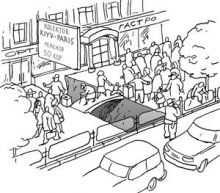Some will probably remember the angry crowds of depositors in front of Ukrainian banks at the peak of the economic crisis, the increasing amount of unpaid bank loans, and the subsequent appearance of “collection firms” — actual gangs specializing in squeezing out borrowers’ money. Newton’s Third Law reads: “For every action there is an equal and opposite reaction.” Sure enough, there emerged business entities that claimed they could effectively deal with these “collectors.” Last week, Ukraine’s first such legally registered entity, known as Vasha nadiia (Your Hope), informed the Zhytomyr Reforms Press Club of having established its seventeenth office. Its founding manager, Fedir Oleksiuk, said there are about fifty such “collection firms” in Ukraine, with ten that should be considered seriously. There are victims: 21 borrowers who committed suicide because they couldn’t make loan payments on time, contrary to the creditors’ insistent demands. Oleksiuk says the activities of these “collectors” aren’t regulated by any laws, that they often use brutal methods; that they aren’t any better than regular racketeers.
He adds that, in the United States, payments under mortgage contracts have been restructured for a duration of 150 years; that Great Britain, Greece, and several other countries have instituted credit holidays, and that similar measures have been taken in Russia, in regard to persons who can legally substantiate their current insolvency. In Ukraine, unpaid loans are soaring (with growth from 50 to 70 percent, according to experts), often because of the rocketing and legally ungrounded interest rates, imposed without prior notice, along with additional penalties. This is what puts such individual borrowers in a hopeless situation.
Members of the Anticollection and Law Supporters Association of Ukraine, created on the initiative of Your Hope and a number of NGOs, have been invited to take part in the working out of bills to help improve the situation. Their proposals boil down to (a) credit holidays instead of pressuring the borrower and seizing his property, provided the loan has legitimate collateral; (b) restructuring loans, forgoing penalties and commission payments; (c) lowering the loan interest rate to that established by the National Bank of Ukraine; (d) liberalization and softening of the repayment procedures.
Toward the end of October, it is planned to hold Ukraine’s first convention of financial service consumers, to institute a corresponding NGO, to allow the borrowers to apply to have their loans bought out (provided current legislation is duly amended), on a par with all such “collectors.” After all has been said and done, the main point is in whether Ukrainian citizens can combine efforts to protect their interests. Estimates show that about four million active citizens are having problems with their banks. In other words, civil society will have the final say. Otherwise we will be back to the times of loan sharks, rather than bona fide bankers, and blood-shedding revolts.
Oleh MALSKY, partner, AstapovLawyers:
“Ukraine’s current legislation doesn’t provide for a number of aspects in the relations between creditors and borrowers. The ongoing crisis shows that banks often find it hard to exact loan payments, take over collateral or conduct a dialog with the borrower because of protracted court procedures and the presence of numerous vehicles that help draw out such procedures and block court rulings.
“Our taxation system hasn’t been helpful for a long time in terms of recovering one’s mortgage or deposit, so that today the banks are seriously concerned about (a) speedy and effective court rulings and (b) loan repayment security reform.
“My word of advice for all those who have suffered from the ‘collectors’ is simple: It’s best to talk to the bank. Practice shows that banks are very considerate in dealing with individual and corporate clients when it comes to restructuring loans, extending the term, renegotiating the interest rate. There are NBU recommendations that set forth certain standards in regard to certain groups [of customers]. One must understand that a bank has its client’s interest uppermost on its mind, as long as this client shows a bona fide attitude to the bank.”
Anatolii ZHUKOV, head of the Legal Board, Association of Ukrainian Banks:
“Speaking of the ‘collectors’ market and its legitimacy, it is important to ascertain whether the sales of bad loans to such companies are possible under the current Criminal Code, notably its articles about assignment.
“In my opinion, passing a bill tightening the rules on bad loans, including the seizure clauses, would help solve a number of problems that exist on the Ukrainian financial market; it would help resume loans to individuals, as well as business entities. As a result of such changes to the law, the creditor and the borrower would have a better view of their relations.
“It’s safe to assume that our bill won’t allow any banks to have any extra loan-repayment-enforcement opportunities. This bill is aimed at removing existing legal discrepancies. We believe that the Verkhovna Rada of Ukraine is also interested in passing bills that will help revive the bank-loaning process, so we hope our bill will be passed in our wording.”








